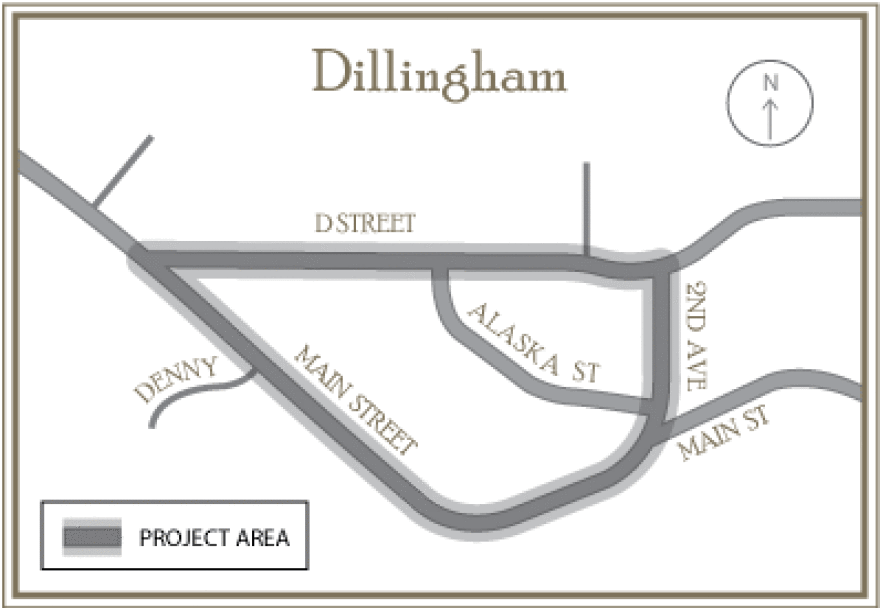In a new KDLG segment, Dillingham city manager Tod Larson explains how the city is working toward a long-term solution for the potholes that plague downtown roads.
Snow and ice make roads around Dillingham a bit slick, but at least they fill in the potholes. Dillingham city manager, Tod Larson, brought five Capital Improvement Projects before the city council at the end of December. Dealing with Dillingham’s downtown road situation is once again on the table, and voters will likely have some say about how the city tackles it.
In today’s Manager’s Corner, a new KDLG segment, Larson explains that the city will seek a $3.4 million bond for its street rehabilitation project. If Dillingham residents and the state approve the bond, the city would begin its work this summer, when the Alaska Department of Transportation is scheduled complete a separate Dillingham downtown repaving project. DOT’s project has been delayed at least two years in a row and has been in planning stages since 2005.
Audio Transcript:
Tod Larson: The five projects we're looking at are -- we need some lagoon aeration. Avery Lill: And that's in the sewage system? TL: That's in the sewage system. The second one is, we have to replace some wells to monitor groundwater out at the landfill. The third project we're looking at is, as you know, the state's still moving forward with the downtown street's project. So we have some infrastructure underneath that needs to be replaced -- old pipes, that kind of stuff. The fourth is the street's project in conjunction with the state's project. We pulverized a number of streets in town because they had failed. And we're looking at, the council's looking at, can we replace those? What's it going to cost? And then the Lake Road Fire Hall, we want to build addition so we can consolidate some equipment that's been stored elsewhere. So we need to bring it back to the fire hall. In a broad brush, that's the five projects. AL: Let's start out this series of conversations talking about roads because that's generated a lot of public interest. When you say that the roads downtown failed, what do you mean by that? TL: A lot of these roads are in a tough area to start with. There's a lot of water. It's very wet, and it makes things fail prematurely. You know, I got here, and the whole community, including the council, everybody's frustrated with all the potholes. And it got so bad that we just -- Quality Asphalt Products was in town, and they were able to pulverize those roads. Basically, just to take out all -- there's no asphalt there now -- to put them back down to dirt and to smooth them out, pack them down. So that's what we're looking at now. Do we want to dig down three feet, replace it, do it the right way and get a lot longer life out of the roads? Do we want to bite the bullet and pay to do that while some of these crews, construction companies, are actually here doing the downtown roads with the state. We could save a lot of money by kind of piggy backing on some of that.

AL: And what has the council decided? TL: They have decided to take this forward for the bonding. We're going to, on Jan. 10 at the next council meeting, introduce a bond ordinance. So it will eventually come out to the voters whether they want us to fix the roads or not. AL: So "bonding" is a word a lot of people probably know but may be super clear on what it means. Can you explain how a bond process works for getting new roads in Dillingham? TL: There's a whole series of things we have to do. We kind of follow a number of different tracks simultaneously. But as far as the bond, the legal process itself, if you will, is the council introduces an ordinance that says, 'Hey, we want a bond for these items. Then they will, two weeks later, on Jan. 24, they will have an adoption of the ordinance. Then, by statute, nine Tuesdays after that, which is March 26, we will have a bond election. That's where the citizens come out and say, 'Yes, we want our roads fixed, and we understand the costs, etc.' or 'No, we don't.' And likely, the other item on there will be the fire hall addition...Between now and then, we'll have a number of meetings for the public -- hearings. The council's going to generate some different meetings to make sure we talk to the citizens enough so they can make an informed decision.

AL: So it's going to go before the voters, whether or not the city's going to bond with the state for these roads. Can you talk a little bit about the pros and cons? What does it mean when a city takes on a bond? Are there additional burdens that it takes on? TL: Well, it's like a long-term loan. So what it does, we'll take it on for a 20-year term. It's basically like you get a low-interest house loan. You pay it for 20 years and pay it off. Kind of the advantage of a bond is sometimes, especially in the state of Alaska, we can get that bond forgiven at some point. And we're going to continue to pursue grants, so we're going to try to get a grant to help pay that off. Yeah, the citizens take that on and say, 'Yeah, we want our roads. Our roads are that important. We want to pay that off over time, but understanding that we'll continue to find other options to pay that bond off earlier.' AL: Got it, so it gives more time to find grants and things like that. TL: Right. AL: And if you decide to go ahead with the project, what's the timeline for getting new roads? TL: We're going to tag along with the state. It's going to be dependent on the state road [rehabilitation project]. Right now the state has every intention to go through with the downtown roads project [in 2019]. We haven't heard that it's been cancelled, delayed or anything. So we'll piggyback with them. If for whatever reason they delay the project again for another year, then we'll likely delay so we can make sure we piggyback with them. We should start work in April, May. The engineers say we can get it all done in one construction season. We should have brand new asphalt, again, if the voters vote it in. You'll have three new street's. Plus, the downtown area will be done. It will be very nice.

AL: And I've got to ask, people have been hearing that that they will get new roads 'next year' for a number of years now; is it looking more promising this year than it had at other points at this time or are we in the same kind of waiting game? TL: Yeah, and that's a hard question for me to answer just because I haven't been here for the other years. I can go from what I've seen. I've had a lot people say, 'Well, yeah, we've been hearing that for years.' But I don't know how to answer that. The state is talking about putting out requests for proposals...once we see that, I'll feel a lot more comfortable. I just have got to stay positive. It feels good to me. I don't have any reason to doubt them. But at the same time, yes, the citizens here have been hearing that for a number of years already. AL: This is really just a tough place to build and keep roads. The companies that you're talking to, are they optimistic that they're going to be able to use new technologies or best technologies to combat some of that? TL: Well, yeah. And I haven't talked to the companies, per say. We're just with the state engineers and the engineers that we use. And this is what they've come up with to use around Alaska. It's state of Alaska standards and rural Alaska for tundra and permafrost. It's the best they have available that we know of right now.
We will be airing a series of conversations with city manager Tod Larson about projects proposed to improve the Dillingham. If you have a question you would like answered on the next Manager’s Corner, email avery@kdlg.org or call 907-842-2200.





